What is the Baby Friendly Initiative?
Recently, our hospital has written an agreement to work toward a Baby Friendly Initiative (BFI) designation. The Baby Friendly Initiative was started by the World Health Organization (WHO) and UNICEF in 1991 to counteract the effects of formula company marketing on breastfeeding rates. This world-renowned designation is no easy feat to accomplish by hospitals, but the number of countries involved has grown to include 152 world-wide.
While I do feel that the WHO Baby Friendly Initiative has both the mothers and infants interest in mind, it has a bad reputation for pressuring moms to breastfeed and shaming moms who use formula. For this reason I had entered this BFI training a skeptic, but on the whole I was pleasantly surprised at how inclusive it appears to be.
However, if we do reach this much sought after designation, there will be changes to how we treat our moms and babies. I really feel that having a heads up to current practices prior to admission would make a world of difference to how a moms postpartum care is perceived!
Changes That A Postpartum Mom May Notice
Breast is Best
![By Ken Hammond ([1]) - USDA, Public Domain, https://commons.wikimedia.org/w/index.php?curid=35620 breastfeeding, baby friendly initiative](https://themamanurse.com/wp-content/uploads/2016/04/Breastfeeding_infant.jpg)
One benefit of a Baby Friendly Initiative hospital is that all nursing staff will receive the same training. Therefore, the information provided to new moms should both be accurate and consistent. There are many misconceptions about breastfeeding, and hopefully teaching new moms will help spread the word and ultimately increase exclusive breastfeeding rates worldwide.
However, it can be very difficult for nurses to provide this information without appearing too pushy or judgmental. There is a risk that if this topic is not approached correctly, it could lead to a lack of trust, the mom becoming guarded if there is a breastfeeding concern, and the mom deciding to make the switch to formula once out of the hospital.
This can be a concern as the nurse won’t have a chance to discuss formula feeding with the mom while in hospital, as we are not to give out information on formula feeding unless a mom requests.
Breast Expression and Cup-Feeding
I love this part about the Baby Friendly Initiative. In their training, the Baby Friendly Initiative recommends teaching all new moms how to manually express their breasts. Not only does the extra stimulation post-feed help a moms milk come in, but also gives baby something to eat while mom and baby are still trying to figure out the latch. Breast expression and cup-feeding puts less stress on obtaining the perfect latch, and more on mom and baby bonding.
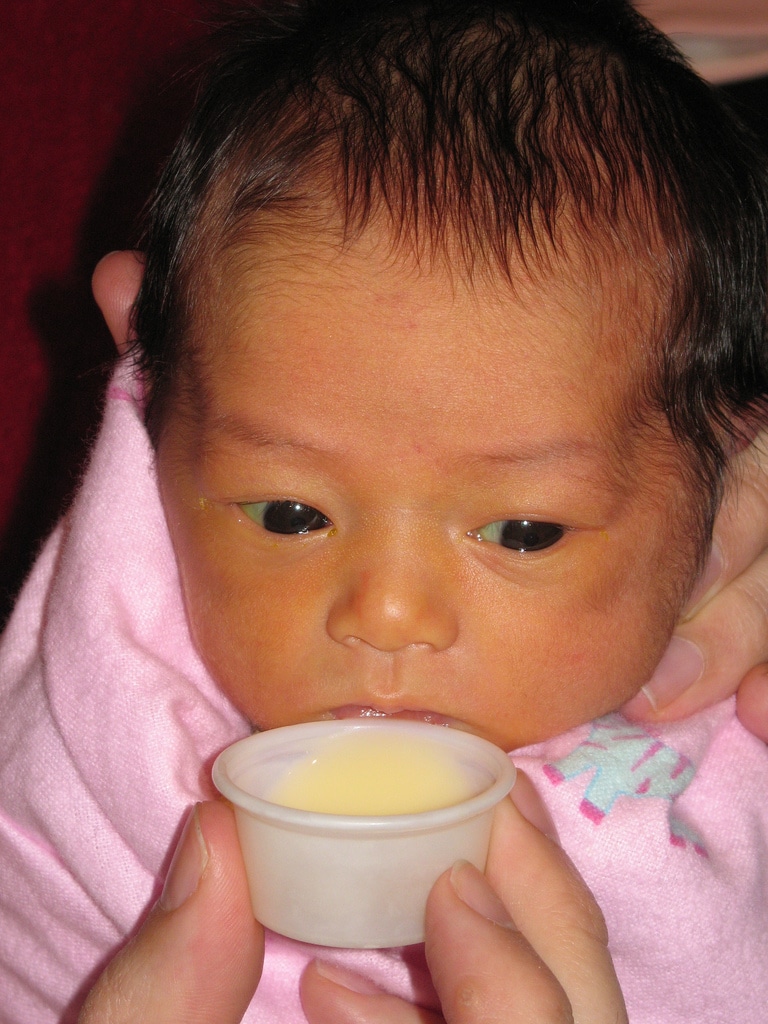
Cup feeding a moms colostrum could prevent the downward spiral of sleepless nights for mom and baby, the need for supplementation with formula, reduced milk supply, and the mommy guilt and feelings of failure.
When a mom manually expresses, she often thinks that she does not have enough milk to satisfy her baby. But she does! A newborn infants stomach is only the size of a chickpea, so the few drops you see in a medicine cup or spoon is all your baby needs.
If your nurse wants to teach you how to manually express and cup feed, try it! While you’re at it, you can express your milk post-feeds, apply it to your nipples and allow to air dry to help prevent infection and ease nipple pain.
Skin-To-Skin

Skin-to-skin has been a gold standard within labour and delivery for many years, but hospitals with the Baby Friendly Initiative designation will go one step further by having policies and staff education in place to make sure skin-to-skin is advocated for at every opportunity. Right now our hospital is working on a policy to implement skin-to-skin immediately after caesarean sections! Very exciting stuff.
24 Hour Rooming In
While our hospital has not yet reached a Baby Friendly Initiative designation, our moms and babies have been rooming together for much longer than I have been working. The benefits of rooming in to mother-infant bonding are tremendous, but there have been times when I have offered to take a baby out of the room at night for short periods.
Usually I do this when it is 3 am and mom and baby have not slept at all. Baby has cluster fed, moms nipples are sore, and she can barely keep her eyes open let alone care for her newborn baby. Or, a mom who laboured for 24 hours, ended up not progressing and is now recovering from an unplanned cesarean section. These moms are exhausted, and these babies just want to be held. Co-sleeping of course is not recommended due to the risk of SIDS.
I would never, ever, provide formula or pacifier to a newborn at night without her mom knowing, but sometimes if it is quiet on the floor I will rock and hold a baby to sleep so her mom can get some much-needed rest.
Hopefully with manual expression and cup feeding, these sleepless nights will be fewer between for our moms and babies. Unfortunately we will no longer be able to offer taking a baby out of the room to give the mom a break.
Formula Only if Medically Indicated
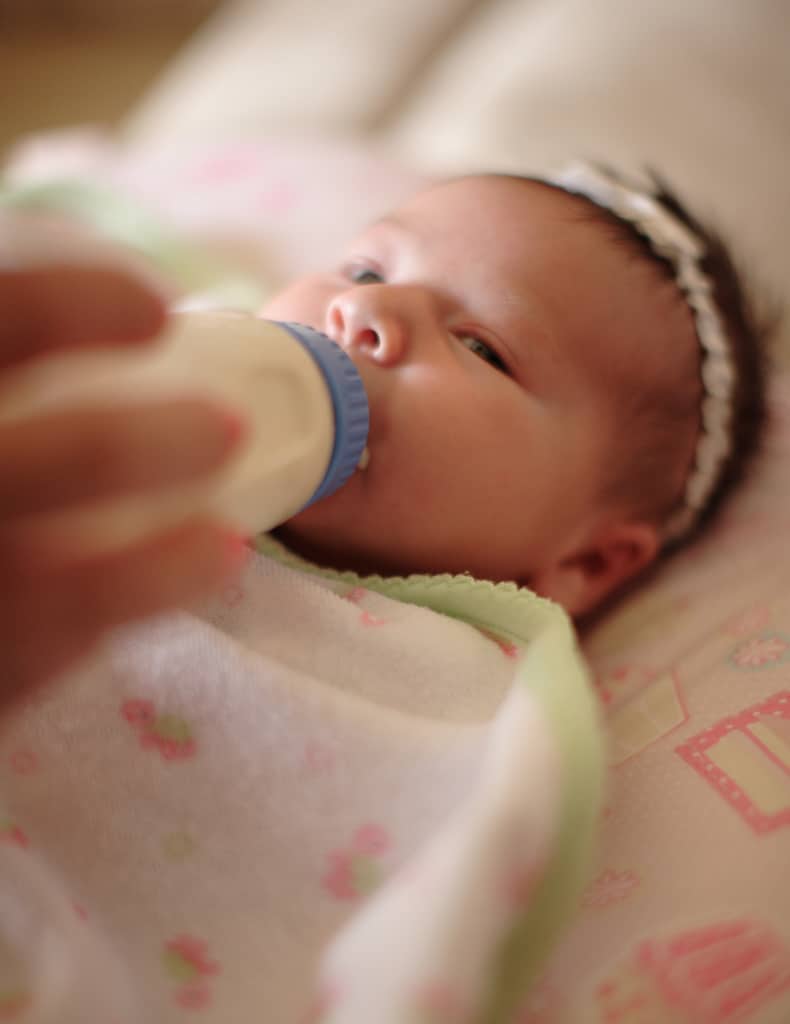
I can say that without a doubt, that these night nurses were not out to get anyone. They probably wanted you and baby to get some rest. With a starving baby with a poor latch and an exhausted mom, everyone will just keep spinning their wheels.
However, giving formula to a baby whose mom has chosen to breastfeed is not the answer, unless it has gone too far. If a baby is too sleepy, her sugars are too low, her weight has dropped below the recommended loss, or mom is taking a medication in which breastfeeding is contraindicated (which doesn’t happen very often), your baby may need to be supplemented with formula.
If your hospital has a Baby Friendly Initiative designation and has a formula free policy, you may need to go out and buy your own formula while in hospital, or they may provide small amounts at a time in a label-free bottle. I have heard of cases where moms must sign a waiver or sign out formula each time they give it to their baby.
While many moms (and even nurses) may see these requirements as formula shaming tactics, in actuality they are in place to ensure that moms and hospital staff are on the same page, and so that no mom feels coerced into formula feeding their baby.
No Bottles or Pacifiers
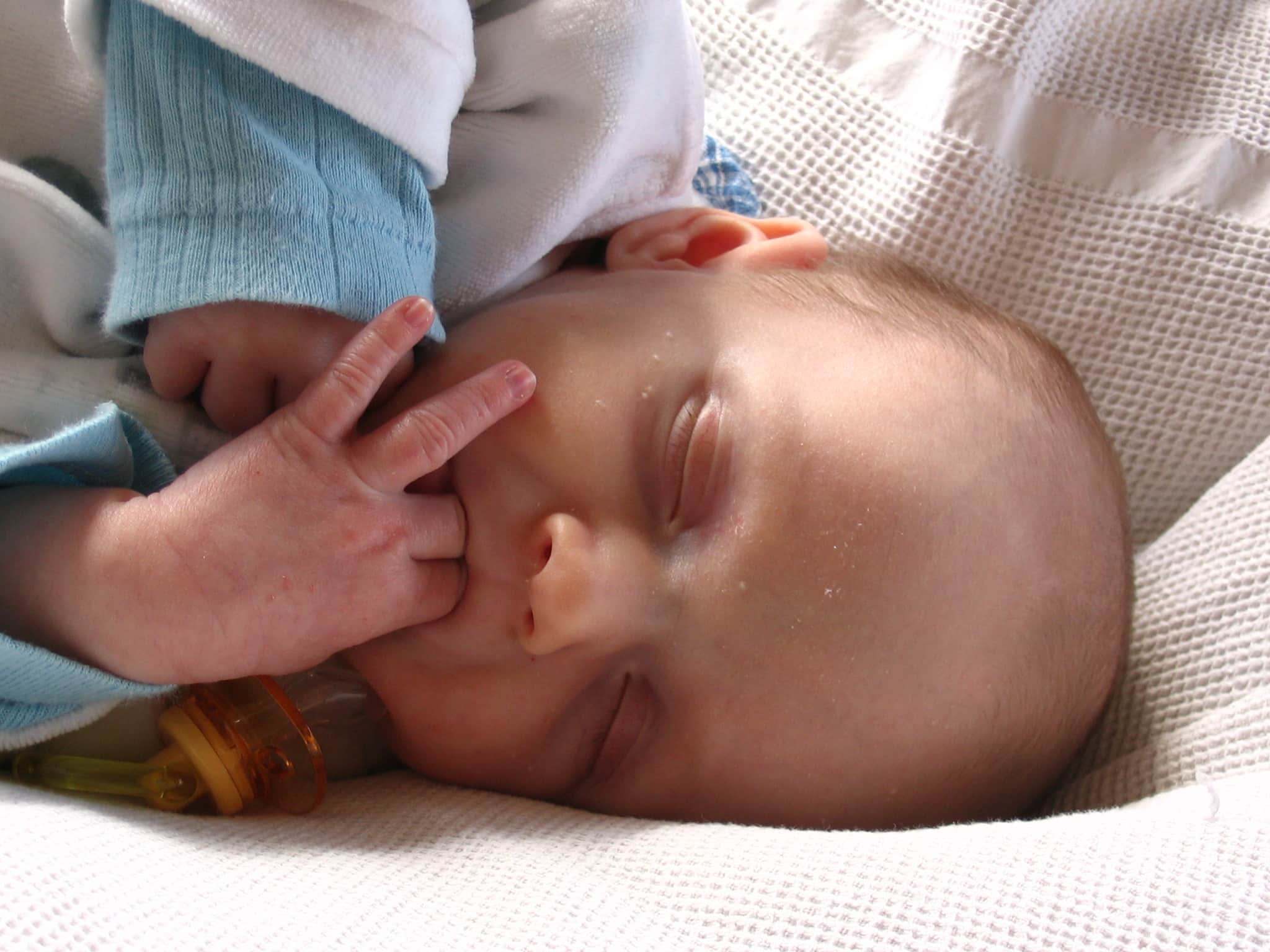
Pacifiers are not recommended when a moms milk supply is still being established as having your newborn suck on a soother may reduce the time spent at the breast.
Manually expressing/ pumping and then cup feeding your baby can be a great option when a mom is unable to breastfeed for whatever reason. Feeding your baby formula from a cup or spoon, learning paced bottle feeding, feeding small amounts at a time and pumping your breasts during each feed can really help ease the transition back to breastfeeding.
This is very different for a mom who has made an educated decision to formula feed or if a mom is unable to breastfeed her baby. For these babies, bottle feeding will most likely be the easiest option. In addition, research now shows that pacifiers used by formula fed infants can actually decrease the incidence of SIDS and therefore their use is recommended.
No Samples Allowed
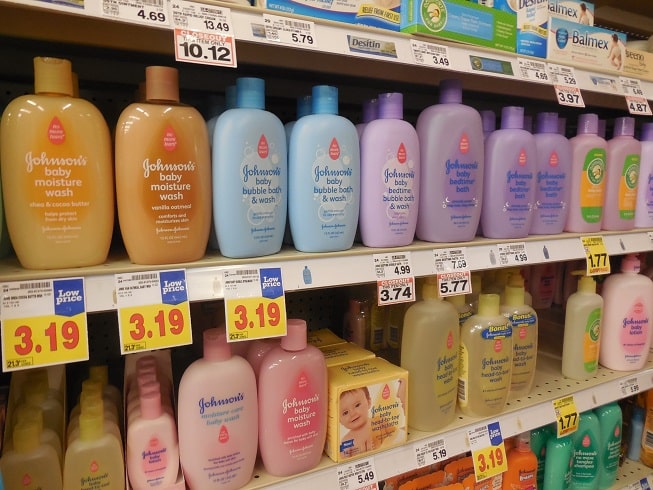
This means that moms and babies will not receive many of the samples that previously were provided, such as lanolin cream or Johnson & Johnson baby wash, unless the hospital pays for it from their own pocket. The public hospitals in my area have been at a 0% budget increase for the past three years, and the likelihood of having extra cash to give out samples to new moms is very slim.
Please don’t be terribly offended if we don’t have any samples to give you and have to ask that you go get a product from the local pharmacy! If we could give it to you, we would.
Linking Up With Community Resources
Before you are discharged from hospital, as a new mom you should be provided a list of community resources to help you with breastfeeding.
Since hospital stays for postpartum moms and babies range from 24 – 72 hours, there isn’t much time for nurses to make sure feeding is going well. Of course we do our best to help you, but it is nice to know that there are many resources available near you if you hit a speed bump along the way. These may include:
- La Leche League
- The MotHERS Program: Telehealth Ontario has a separate line for breastfeeding moms
- Lactation Consultants and breastfeeding clinics in your area
- In home visits by a public health nurse
Is My Hospital Baby Friendly?
The Baby Friendly Initiative is meant to be just that – baby friendly. It is all about educating families, providing resources, assisting with infant attachment and doing what is best for your baby.
If you want to know if your local hospital has or is trying to obtain a Baby Friendly Initiative designation, feel free to contact your Labour and Delivery ward or ask your obstetrician at your next appointment.
Currently, only three hospitals in Ontario have achieved this designation, including St. Joseph’s Health Care in Hamilton, Grand River in Kitchener, and Toronto East General but many other hospitals are working towards it. You can see the whole list of BFI facilities in Canada HERE and in the United States HERE.
Knowing ahead of time what to expect at your hospital may help you as a mom have the enjoyable experience that you are meant to have with your beautiful new baby. I hope this helps you understand more about the Baby Friendly Initiative designation.
Book your online lactation consultation here
Have you heard of the Baby Friendly Initiative? If you have comments or experiences, please share below!

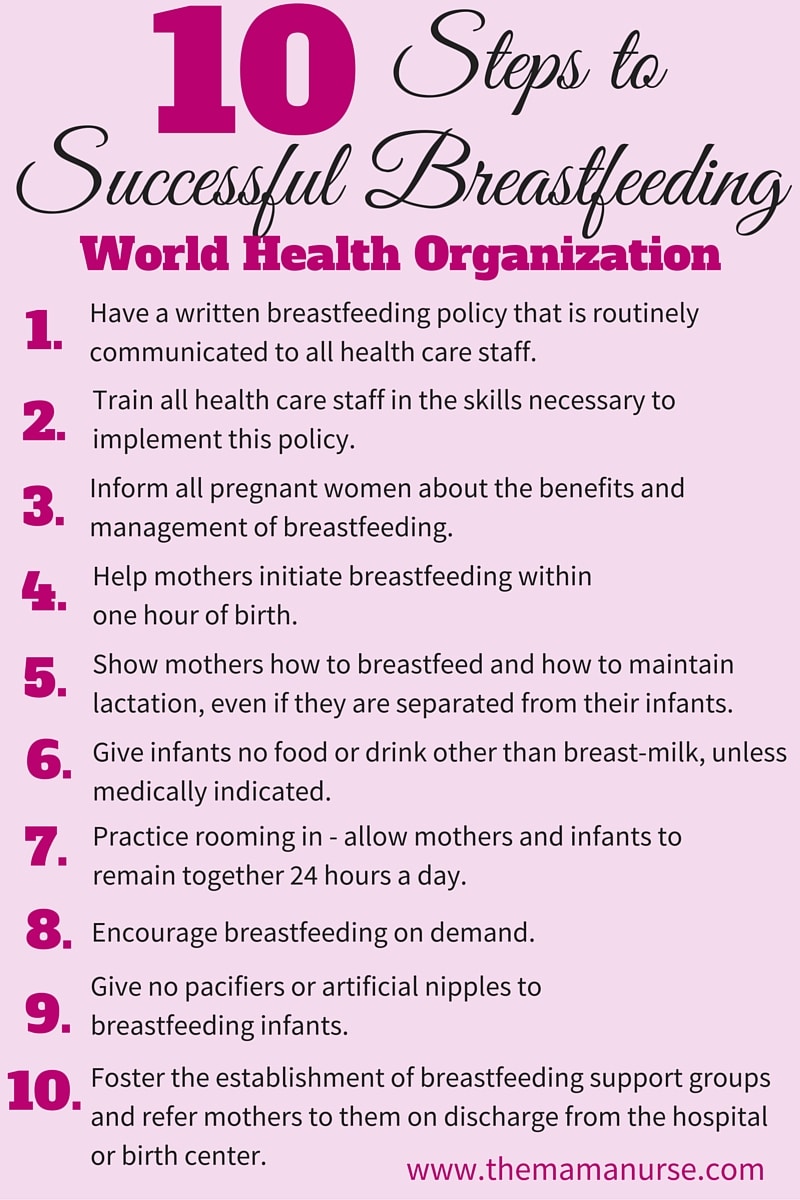
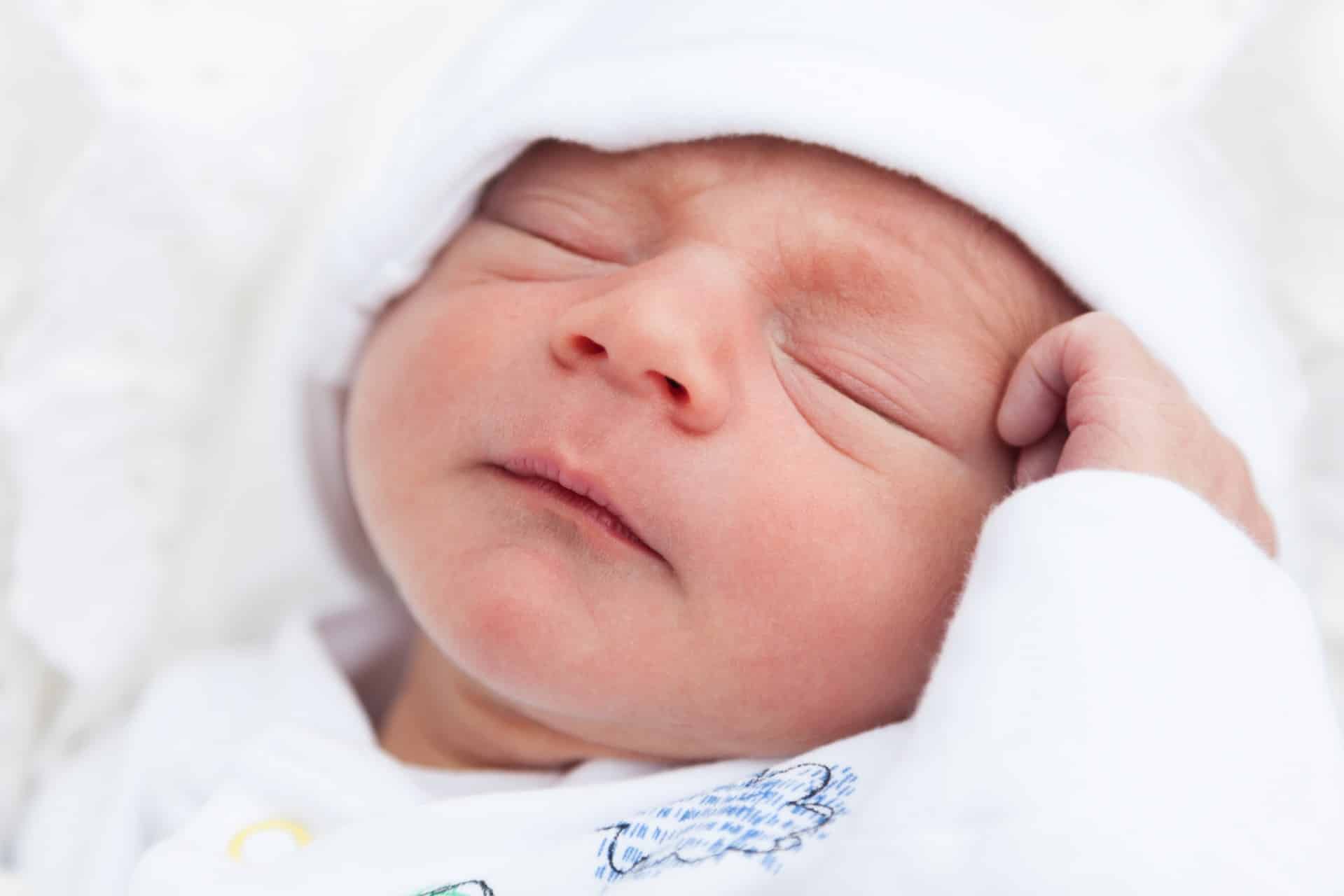
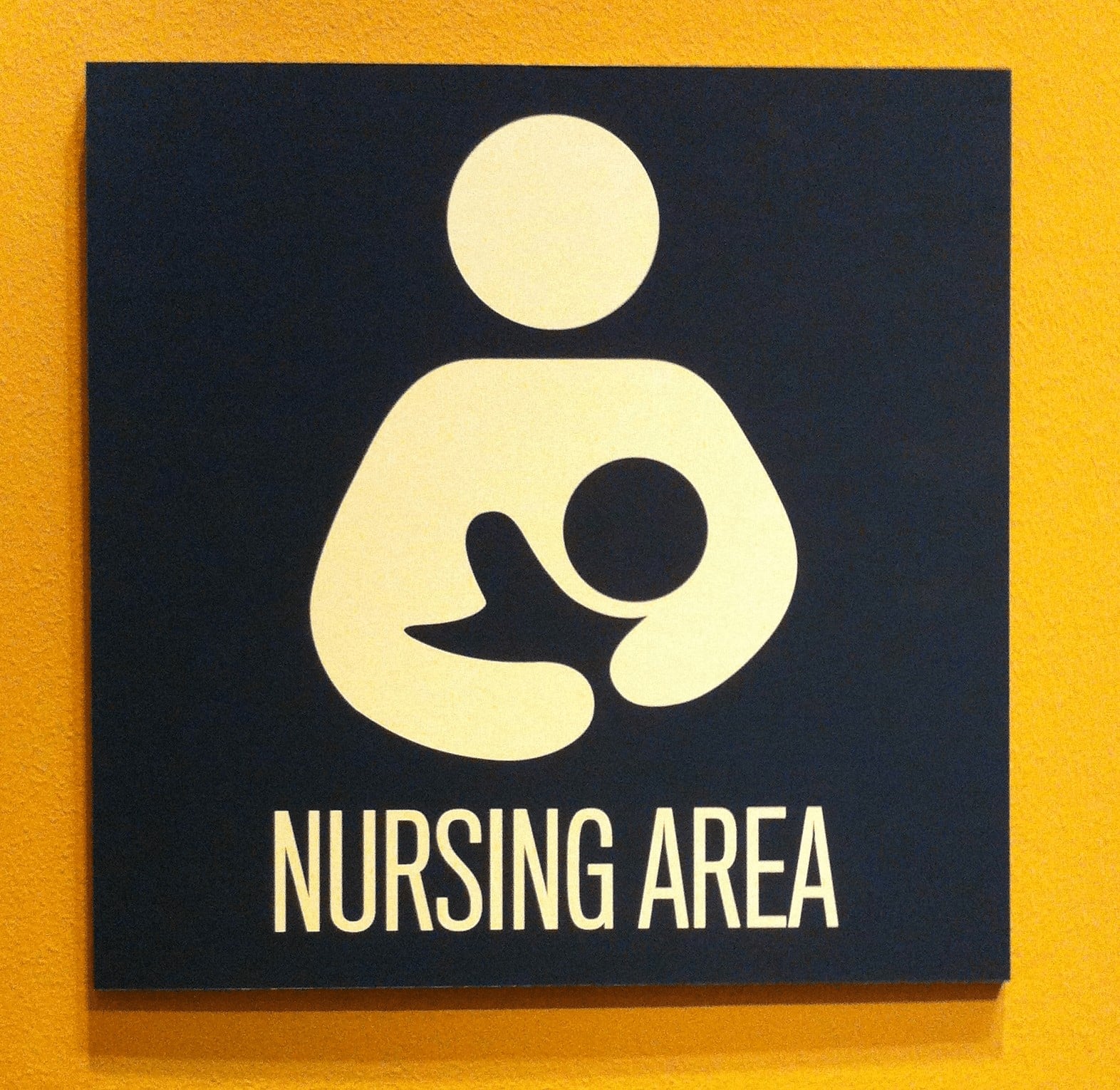
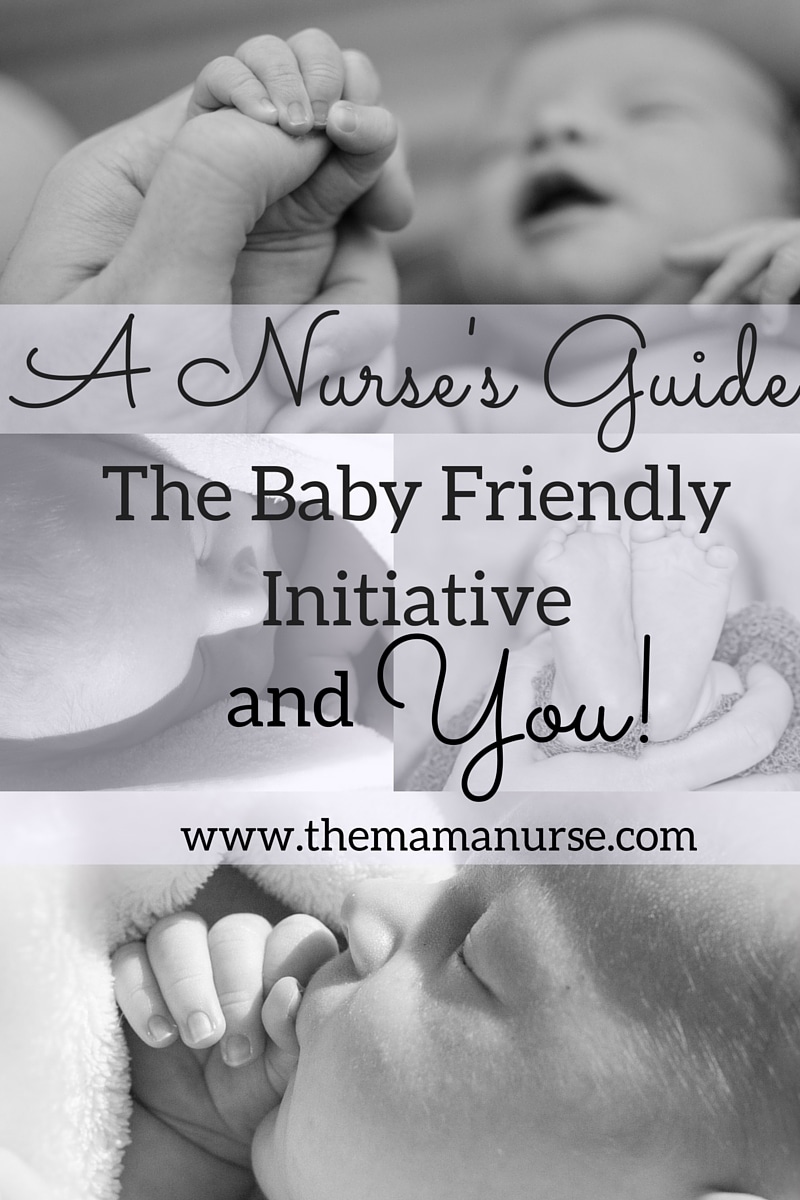



This brought back so many memories of my days working in the NBN! This was many years ago, and the babies spent quite a bit of time in the nursery, and I loved nothing better than to sit and rock a baby to sleep – thinking “And the government is paying me for this?”
Yes! I love getting paid while getting me some baby snuggles 😀
Great post, very informative I wasn’t aware this was provided in some hospitals. The parts about guilt or how to approach subjects is important and yet must be difficult at times, to find that balance. You all work so hard and as a mom, I really appreciated the help and guidance I received at the hospital. I love the photos. Making me miss my little ones that now tower over me. Sigh!
Thanks for stopping by Jen! I’m glad that you had a positive experience with your nurses 🙂
I hope they are inclusive – women should have the choice to feed their baby what they want.
Me too! Thanks for commenting 🙂
My hospital was considered breastfeeding friendly and they even run their own support group but no one taught me how to hand express to cup feed. My baby had blood sugar issues so they always had me try to breastfeed first but then give formula to stabilize his vitals, so he got spoiled by the bottle and we had a difficult breastfeeding journey. I’m still thankful to have kept up for 14 months.
Congrats on 14 months Julie! I only made it 6 with my son and I still feel guilty (which I know I shouldn’t!) I’m not sure about other hospitals, but our training focused a lot of time on teaching hand expression and cup feeding. I was super excited about it because of all the late nights I’ve witnessed where baby won’t latch and no one gets any sleep, and then baby gets sleepy.
This is such a great balanced look at it. I too can definitely see the benefits of the initiative, but so often good research transfers poorly to good practice. It’s so difficult to strike a balance.
Bottom line is we need way, way more support for breastfeeding moms. I had trouble with my 3rd as a NICU nurse, who had previously breastfed 2 kids, had 2 LCs and many nurses on speed dial. It can be so challenging and I thought it was very interesting that the breastfeeding clinic was plastered with posters on PPD. I definitely spiralled very quickly. My baby was losing weight and I couldn’t stop crying and I felt like I had very little professional support, just a lot of amazing friends who got me through it.
Thanks so much for sharing your story, Jenn! I think as nurses (especially OB/NICU nurses), you think that you’re supposed to just inherently know how to look after a baby. Including breastfeeding. It’s a lot of pressure! I agree that there is a disconnect to supports available, and I hope that this initiative will help connect postpartum moms to the resources available in the community.
Very informative!
Thanks!
I love this initiative and the hospital where I gave birth to both of my sons is definitely baby friendly. I think communication is key. I was never pressured or shamed either way – they just wanted to know, how did I want to feed my baby? And how could they support me? It was wonderful.
Yay that is excellent! It always makes me so happy to hear moms positive birth experiences!
This is a wonderfully necessary initiative. I gave birth in a baby friendly hospital and it made a world of difference. Thanks for sharing such great info! #passthesauce
So nice to hear a positive outlook on the BFI! Thanks for stopping by!
I had trouble breastfeeding my daughter when she was born. I did use formula because my milk took so long to come in. Well, she got frustrated that my breast wasn’t letting down as fast as the bottle. Overtime she got used to my let down. I didn’t feel pressured either way at my hospital. They just went along with whatever I wanted to do. But the lactation consultant helped me so much. I need to check out my hospital to see if they follow this.
Breastfeeding is not as simple as some would believe. I’m so glad that you and your baby were able to find your groove, and were able to do so without being judged! That makes me super happy 😀
Once again, your info is so thorough and amazing! When I gave birth to my son, the lactation consultant wasn’t actually as helpful as she thought she was, and was very against formula. When I ended up switching to formula completely, I felt like such a failure and had so much mommy guilt. A little more help from an awesome nurse like you would have gone a long way! 🙂
Thanks so much Samantha! I really try to make my posts as helpful as possible. I’m sorry to hear your experience with the lactation consultant wasn’t positive. I’m sure she tried her best, but as you probably already know I don’t see the point of judging moms for using formula. You just need to do what works!
This sounds like a great initiative. But like you say, nurses and hospitals would have to implement this with sensitivity. The best way is always through education and yes, support with community resources is so important in sustaining that breastfeeding relationship. Interesting read. Thanks for sharing with #PasstheSauce
Thanks so much for reading! It is a sensitive balance, between educating and assisting with breastfeeding, while also ensuring everyone feels supported no matter the parenting decisions they have made. Becoming a mom has opened my eyes to how difficult following the guidelines can be!
I gave birth at a baby friend hospital last year, and it was such a different experience than with my first baby. They even had donor milk available if medically needed (my son was IUGR and his blood sugar was borderline low…fortunately lots of skin to skin and frequent feedings helped.) My nurses did offer to take my son at night and bring him back to feed, so I guess they broke the rules 😀 But I am grateful for all the breastfeeding support they gave us!
I am due to give birth to twins soon and I am a little bit terrified about giving birth at a Baby-Friendly hospital. The implication seems to be that “properly informed” mothers will always choose to breastfeed, so if you don’t want to breastfeed, you clearly haven’t been given the right information. I’m a research specialist who has read all of the studies on breastfeeding, and study after study has shown no difference in long term outcomes for children across the population, and a sibling study shows no differences even in infancy – effectively, the studies are plagued by confounding factors. I am planning to combo feed, and am expecting push back. Do you have any tips for someone like me, who considers herself to be making an educated, well-informed decision that she knows the lactation consultants just won’t agree with?
Hey Laura, thanks so much for your comment. There is definitely a huge push towards breastfeeding in the hospital and unfortunately this extra health teaching, while well-intentioned, can easily be misconstrued as being judgemental or pushy. When I took the BFI training, they stressed the fact that it is supposed to be “baby” friendly instead of “breastfeeding” friendly. Their focus is supposed to be on informed decision making, and they are to be accepting of parent’s wishes so long as they are making an educated decision. It sounds to me like you are doing just that. There are many moms who choose to combination feed and do great. My advice would be in part to wait and see what happens, and if you want to add formula in, by all means. The only warning I would have is to protect your milk supply, because it works by supply on demand and if your babies fill up on formula then it may dwindle. It may help in the beginning to pump during those formula feedings until your milk supply is well established. Also, if you are planning to formula feed in hospital, you may want to consider bringing in your own ready-to-feed formula. I have heard that some BFI hospitals require nurses to sign out formula and remove all labels, so bringing your own may ease some of your worries about judgement. Just remember that most nurses are pretty open and many may have even formula fed their own babies, but they are following policies and procedures that are now being considered “best practice” by the World Health Organisation. The BFI was instituted because of the negative impact advertising of formula companies had caused on breastfeeding rates in low income areas, thus increasing rates of mortality caused by dehydration. The low percentage of breastfeeding rates in third world countries is very unfortunate since most families cannot easily afford a quality formula, and the BFI is working towards increasing breastfeeding rates worldwide. I hope this helps a bit, congratulations and I wish you and your twin babies all the best! I also have an article on best practice with using formula if interested under the “A Nurse’s Guide” tab!